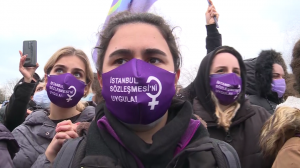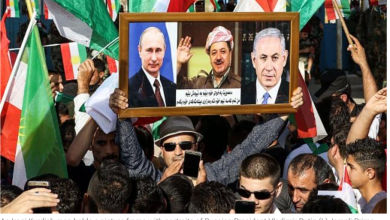Femicide, or murder of women, is unfortunately an all too familiar phenomenon in Kurdistan. Despite various legislations and criminal approaches, in 2021 the number of murders of Kurdish women in Iran, Turkey and Iraqi Kurdistan is again steadily increasing.
By Hedwig Kuijpers, translated from Dutch.
Iranian Kurdistan is buzzing with rumors of the latest victim of “femicide,” or murder of women. The burned body of a 26-year-old Kurdish law student named Gulale Shekhi was found somewhere between Saqqez and Sanandaj. This terrible murder case is raising many questions in the local population.
Gulale went on vacation two weeks ago with her fiancé-also her cousin-who had subsequently contacted his family by phone, telling them that he had killed Gulale, hidden her body on the Saqqez-Sanandaj stretch, and was thus now on the run. After several days, Gulale’s burned body was recovered by search teams from the Iranian government. The same day, Gulale’s fiancée was arrested.
According to several Kurdish- and Persian-language news sites, fiancé Kayumars and a friend doused Gulale with 4 liters of gasoline and set her on fire before hiding her body.
In the past thirty days, as many as five Kurdish-Iranian women were killed by people of their own family or acquaintances. In four of the five cases recorded, the women were murdered by their husbands or fiancés.
Turkey remains first
According to a report by the We Will Stop Femicide Platform (Kadın Cinayetlerini Durduracağız Platformu), the number of cases of the killing of women by men in the month of May also unfortunately did not decrease in the Kurdish regions of Turkey. Men killed 17 women across Turkey in May. In addition, 20 women were found dead under suspicious circumstances.
According to the report, of the 17 women killed in May, 2 were killed by their son, 1 by an acquaintance, 1 by her father, 7 by their husband, 3 by their ex-husband, 1 by her partner and 1 by her ex-partner. The report also states that as many as 10 of the murdered women were killed in their homes and 2 in the middle of the street.

Pinar Gultekin, a Turkish-Kurdish student whose body was recovered in a barrel. Pinar’s brutal murder became world news.
Iraqi Kurdistan
On Tuesday, it was reported that a Kurdish woman was murdered by her ex-husband in the Bakarjo neighborhood of Sulaimani. The couple had since divorced, but were still living in the same house.
The victim is at least the thirteenth woman to die a violent death in Iraqi Kurdistan, and the eleventh to be murdered since late March. Two suicides have also been confirmed. All murders (as well as the suicides) are honor killings and domestic violence related.
President Masrour Barzani tweeted on April 17, “I am appalled by the brutal murder of a young woman yesterday in Erbil. There is no honor in “honor” killings; it is murder, it sets us back, and must stop. I have instructed the interior minister to ensure that the perpetrator is punished before the law.”, following extensive criticism that the local government is not doing enough about violence against women.

Legislation falls short in Iraqi Kurdistan
Violence against women and girls is common and endemic in Iraqi Kurdistan, despite promises by the Kurdistan Regional Government to address the problem. Local culture there is more difficult than in other parts of Kurdistan. Divorce remains a big taboo, and is only slightly accepted as a solution to domestic violence. Consequently, Kurdish women often commit suicide to escape domestic violence or forced marriages.
Perpetrators of femicide often go unpunished in Iraqi Kurdistan or spend only a short time in prison.
The Death Penalty
In Iranian Kurdistan, divorce is now more accepted. In general, the divorce rate in Iran is very high, although it is often a little more difficult in Iranian Kurdistan due to the mostly feudal tribal culture. However, there is a trend in the number of divorces, many of which are related to domestic violence.
As for murder cases, the Islamic Republic of Iran – which has sharia law – has a very harsh punishment. An eye for an eye, a tooth for a tooth. Murder – including murders against women – is punishable by death. The only way to avoid death penalty is for the perpetrator to ask for forgiveness from immediate family members. This is often accompanied by blood money — large sums of money that are supposed to redeem the crime.
In Iranian Kurdistan, there is a culture of forgiveness. Families more often choose to forgive the perpetrator after several years on Death Row. After all, the perpetrators of murders of women are often family members or acquaintances, which makes the step of actually carrying out the death penalty more difficult for the remaining family members.
Turkey steps out of Istanbul Convention
Last year, shocking news emerged from Turkey’s ruling AKP party, including President Tayyip Erdoğan. There was talk of canceling the Istanbul Convention on preventing and combating violence against women and domestic violence. So in March, Turkey actually stepped out of this convention.
The Istanbul Convention protects women (and LGBTQI people) and holds governments responsible and accountable for their safety. It is a carefully crafted legislative framework that is critical to preventing, charging and punishing violence, especially domestic violence.
Even now, the Turkish government is clearly not doing enough to protect women and the marginalized. There are not enough deterrents against femicide, domestic violence, sexual harassment, violence against women and rape.
Many perpetrators receive light sentences, if any. Therefore, the withdrawal from the Istanbul Convention will have disastrous consequences for the safety of women and LGBTQ+ people in Turkey.

Women in Turkey demonstrated against the withdrawal from the Istanbul Convention. Their masks read, “Implement the Istanbul Convention!”
Culture-related
Femicide and honor killings in Kurdistan are strongly culture-related. Women’s bodies are key to a family’s position within the community. Therefore, embodied experience is vital to understanding women’s lives, both in Kurdistan and in the Kurdish diaspora.
Murder of women, wherever it occurs, is legitimized by the notion that the man’s “honor” and reputation must be preserved at all costs, and that women are responsible for maintaining “honor” within the family.
When one sees that despite different legislations of different countries, and the fact that the Kurds do not all adhere to the same religion or beliefs, femicide still remains a major issue among the Kurdish population, it quickly becomes clear that it is a culture-related phenomenon.
A solution to femicide therefore still seems far out of reach.






